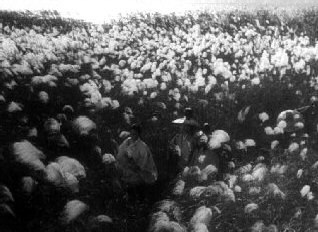 Anthony Lane deemed such celluloid the visual equivalent of "perfect pitch." Godard and Kurosawa gushed about the master, Kenji Mizoguchi. I myself had never heard of him, but what would I know about Japanese directors whose most profound works were from the silent era? My own unawareness merely reflects a much broader trend about how Mizoguchi's stature has waned over the decades. In early drafts of "Greatest Movies of All-Time" list-making, his 1954 film, Sansho the Bailiff, routinely brushed shoulders with La Dolce Vita, The Battleship Potemkin, and The Grand Illusion.
Anthony Lane deemed such celluloid the visual equivalent of "perfect pitch." Godard and Kurosawa gushed about the master, Kenji Mizoguchi. I myself had never heard of him, but what would I know about Japanese directors whose most profound works were from the silent era? My own unawareness merely reflects a much broader trend about how Mizoguchi's stature has waned over the decades. In early drafts of "Greatest Movies of All-Time" list-making, his 1954 film, Sansho the Bailiff, routinely brushed shoulders with La Dolce Vita, The Battleship Potemkin, and The Grand Illusion. Squeezing into the last seat in the theatre at Film Forum, I understand just why Sansho has been relegated to the lower depths of public consciousness, in that his mastery of understatement, subtlety, and capturing the smallest gestures of the human situation don't shake the seats quite like exploding helicopters. There's not even a samurai showdown. Or a defeat over evil, or a conquering of adversity, of the balm that we ask of all our entertainment. Instead, the film whispers about mercy, murmurs about how "humans have little sympathy for things that don't directly concern them," mentions just once about having closeness to the Buddha, but Mizoguchi's involvement with Buddhism infuses his later works.
There are no real sparks, but the friction that gives the two hours its sloooow burn arises from how such a small spark of idealism nears extinction in the bluster of this world, lost in its chilly reality. There's an acceptance of brutality by a family broken apart by slave-traders, a near-surrender to fate. A prayer from behind a gate has a slave longing to be "reincarnated rich." The protagonist, Zushio, actually abandons all hope and behaves as his masters do, cruelly branding runaways and leaving the sick to be picked apart by carrion birds so as to curry their favor. Inoculated to their cruelty, it's only in the smallest of kernels that hope continues to flicker and exist.
And go figure, such resilience is expressed through song, a plaint sung by Zushio's mother, separated by the slave trade and kept on an island. Somehow this sung fragment carries across the waves, instilling hope in her imprisoned children when they overhear their names in its coarse melody. The chorus, much like Buddhism itself, acquiesces to that most basic quality of being here and makes it into a mantra: "Isn't life a torture?"